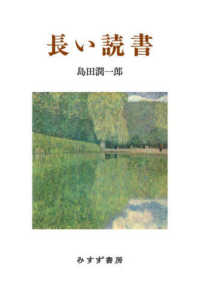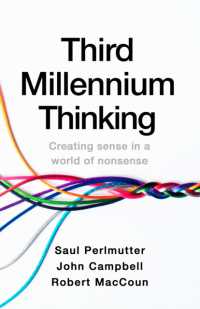- ホーム
- > 洋書
- > 英文書
- > Science / Mathematics
Full Description
This invaluable resource tells the complete story of failure mechanisms—from basic concepts to the tools necessary to conduct reliability tests and analyze the results. Both a text and a reference work for this important area of semiconductor technology, it assumes no reliability education or experience. It also offers the first reference book with all relevant physics, equations, and step-by-step procedures for CMOS technology reliability in one place. Practical appendices provide basic experimental procedures that include experiment design, performing stressing in the laboratory, data analysis, reliability projections, and interpreting projections.
Contents
Preface. 1 INTRODUCTION (Alvin W. Strong).
1.1 Book Philosophy.
1.2 Lifetime and Acceleration Concepts.
1.3 Mechanism Types.
1.4 Reliability Statistics.
1.5 Chi-Square and Student t Distributions.
1.6 Application.
2 DIELECTRIC CHARACTERIZATION AND RELIABILITY METHODOLOGY (Ernest Y. Wu, Rolf-Peter Vollertsen, and Jordi Sune).
2.1 Introduction.
2.2 Fundamentals of Insulator Physics and Characterization.
2.3 Measurement of Dielectric Reliability.
2.4 Fundamentals of Dielectric Breakdown Statistics.
2.5 Summary and Future Trends.
3 DIELECTRIC BREAKDOWN OF GATE OXIDES: PHYSICS AND EXPERIMENTS (Ernest Y. Wu, Rolf-Peter Vollertsen, and Jordi Sune).
3.1 Introduction.
3.2 Physics of Degradation and Breakdown.
3.3 Physical Models for Oxide Degradation and Breakdown.
3.4 Experimental Results of Oxide Breakdown.
3.5 Post-Breakdown Phenomena.
4 NEGATIVE BIAS TEMPERATURE INSTABILITIES IN pMOSFET DEVICES (Giuseppe LaRosa).
4.1 Introduction.
4.2 Considerations on NBTI Stress Configurations.
4.3 Appropriate NBTI Stress Bias Dependence.
4.4 Nature of the NBTI Damage.
4.5 Impact of the NBTI Damage to Key pMOSFET Transistor Parameters.
4.6 Physical Mechanisms Contributing to the NBTI Damage.
4.7 Key Experimental Observations on the NBTI Damage.
4.8 Nit Generation by Reaction-Diffusion (R-D) Processes.
4.9 Hole Trapping Modeling.
4.10 NBTI Dependence on CMOS Processes.
4.11 NBTI Dependence on Area Scaling.
4.12 Overview of Key NBTI Features.
5 HOT CARRIERS (Stewart E. Rauch, III).
5.1 Introduction.
5.2 Hot Carriers: Physical Generation and Injection Mechanisms.
5.3 Hot Carrier Damage Mechanisms.
5.4 HC Impact to MOSFET Characteristics.
5.5 Hot Carrier Shift Models.
6 STRESS-INDUCED VOIDING (Timothy D. Sullivan).
6.1 Introduction.
6.2 Theory and Model.
6.3 Role of the Overlying Dielectric.
6.4 Summary of Voiding in Al Metallizations
6.5 Stress Voiding in Cu Interconnects.
6.6 Concluding Remarks.
7 ELECTROMIGRATION (Timothy D. Sullivan).
7.1 Introduction.
7.2 Metallization Failure.
7.3 Electromigration.
7.4 General Approach to Electromigration Reliability.
7.5 Thermal Considerations for Electromigration.
7.6 Closing Remarks.
Index.
-

- 和書
- 長い読書




